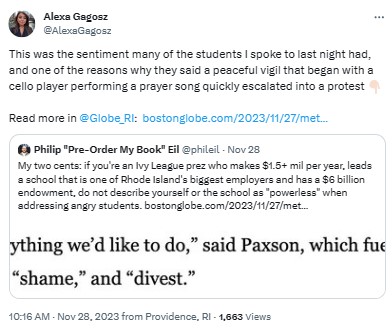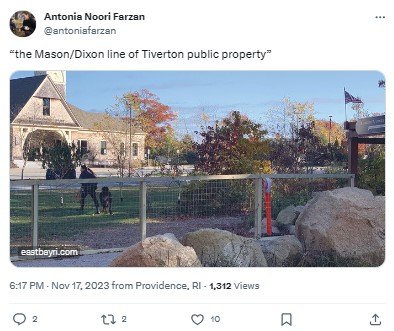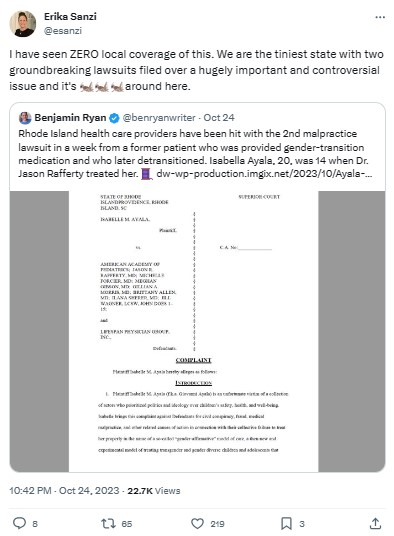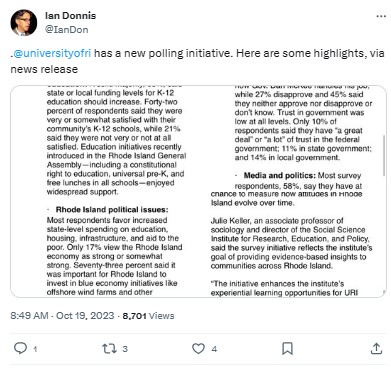On WNRI 1380 AM/95.1 FM, John DePetro and Justin Katz discuss:
- Ideological rot in the Ivies
- When the governor’s got nothing but some basic maintenance to talk about
- Procaccini and Neronha bring up an important question… badly
- What’s the real point of police in schools?
Featured image by Justin Katz using Dall-E 3.
[Open full post]Maybe I’m getting old and crotchety, but these performances just seem so silly, lately:

They’re basically elitists passing through on their way to lives of privilege and entitlement, yet we act simultaneously as if they’ve got some long-standing right to dictate the actions of the institutions and that those institutions’ highest purpose is to give them a forum for performance art against privilege.
Anyway, congrats all around for convincing many of us that recent Ivy grads are to be avoided in the professional realm.
[Open full post]Silly and local as it is, this is one of those stories that makes me despair for the future:

A few years ago, some folks petitioned for Tiverton to give some land next to the library to a group that wanted to put together a dog park. People using it are supposed to park across a lightly traveled road, but they’ve usually parked in the library parking lot. One day, they were having an event of some kind, and I actually had to drive into the library parking lot the wrong way because they were blocking access.
To address these problems, the library put up a fence that makes the dog park parking as convenient as the library lot to access the dog park. This is the controversy:
The fence, which has been on the library’s list of “to do” projects for more than a year, is intended to clearly show the dog park’s boundaries and its entrance point, and to encourage visitors to use parking spaces on the nearby town recreation property on Roosevelt Avenue, rather than library property, when using the park.
But not all appreciate it, and in online discussions have called it “spite fence,” a “vindictive” act, and more dramatically, “the Mason/Dixon line of Tiverton public property.”
Government is meant to help us find ways to live together, but some people will never be happy. Every accommodation they must make to others is an afront, and every assertion of contrary interests is an act of war. Frankly, they’re making a case for saying “no” much sooner. No donation of land for the dog park, no trouble for the library. Life is simple.
Perhaps a broader point of political philosophy can be derived from this example. If the library and the dog park were private parties, the neighbors could turn to the local government to arbitrate their interests according to objective rules. While the dog park faction might not like a fence in a certain place, if it is within the property and rights of the library faction to put one up, the government will recognize that fact, and everybody can move on.
In contrast, as more of our activities are processed through government — as with a government-run library or a donation of public land to a dog park — making your neighbor do what you want (or not do what you don’t want) becomes a political possibility. At the end of that road is dictatorship and social division.
[Open full post]This will look familiar to anybody with even a passing familiarity with the history of the Twentieth Century:

Leftists are constantly provoking and agitating the public in their lust for power, and eventually people rebel, sometimes while being driven into the arms of the Far Right in an enemy-of-my-enemy way. Socialism is a divisive, Satanic force.
[Open full post]That’s a deliberately provocative statement, but it points to a common error in our thinking. When aspects of our culture strike us as bad, or at least wrong, we tend to think of them as lingering shadows from our benighted past. We see more clearly these days, right?
But some of those things — maybe many or most — could have developed for a reason and evolved in subtle ways to provide multiple benefits that we cannot see because we take them for granted. Subjecting kids to a Lord of the Flies environment in which they resolve their own problems, for example, does teach them to… resolve problems. Naturally, they frequently do so in ways we don’t like, such as bullying, but we should arguably trust an evolved culture to have balanced the pros and cons better than we can reactively accomplish from within it.
I’ve thought about this as stories emerge of girls physically hurt during sporting competitions to which males have only recently been permitted. In the past, perhaps boys choosing to play those games would have been aware of the risk that harming girls would bring the unwelcome attention of boyfriends. Maybe they would have thought twice about playing, or maybe they’d have been more careful while doing so.
To be sure, the progressive always wishes to march on, so he or she will now object that this is tantamount to inviting bullying of transgenders. In addition to defining every conflict they don’t like as “bullying,” this only brings us to the next level of thinking we know all the consequences of the modern social innovations they support.
[Open full post]We’re descending to a place, in the United States and Rhode Island, in which controversy is not permitted over certain subjects, as Erika Sanzi points out:

Of course, several trends probably all come together. Media outlets don’t have the business model to fund all that they used to, and most journalists don’t have the legal expertise to understand these issues, so they’re reluctant to use their limited time to step into a contentious issue, especially when their reportage could raise questions about a cause they support.
[Open full post]It’s strange to note, but Providence Journal political reporter Kathy Gregg got some heat from others in the local media (specifically from the Boston Globe) for writing this:
The political flap erupted a week after Cicilline – a leader in the second impeachment of former President Donald Trump – told the Boston Globe and more recently a group of journalism fellows that the non-profit, tax-exempt charitable foundation he heads intends to invest in “local journalism.”
“Supporting local journalism in a community is not a luxury, it’s a necessity,” Cicilline told Globe columnist Dan McGowan during a one-on-one on what’s ahead for the R.I. Foundation. (The foundation has not yet responded to inquiries about the well-endowed organization’s intention in the R.I. media landscape.)
Gregg’s social media take was even stronger: “Why do former @RepCicilline and the members of the board of the @RIFoundation want to put their thumbs on the scale of local journalism in Rhode Island?”
Journalists who object to Kathy’s curiosity give the sense of protesting too much — as if they’re hoping to enjoy the benefits of some of that “investment.” The Foundation is arguably the most powerful non-governmental organization in the state, after the labor unions. If the goal of journalism is (as journalists still like to say) to discomfort the powerful, well, the Rhode Island Foundation is the voice of the powerful. A sitting U.S. Congressman just left his position early in order to take its reins! Yet, many journalists are surely anxious to find their own comfort under its wing.
Cicilline makes it sound as if the intent is pure, innocent, even-handed support for local journalism as a social safeguard, but ask yourself: would he and the foundation fund Anchor Rising. Not a chance.
This plain observation has much broader implications. Things have been thus for a long while. Graduate schools and professorships, fellowships, grants… if you’re supportive of progressives’ social movement, or at least reliably silent about the issues central to it, then you have a chance. Otherwise, you’re out. And if they’re providing the funding for or management of an industry, whether the news media or higher education, that industry will quickly become little more than an ideological vessel. This is how progressives have come to so dominate the discourse, to the point that professors are happy to call for genocide in the Jewish state.
Turning this around, if it is possible, will be the work of decades, and the first step is observing the obvious reality that we face.
Featured image by Justin Katz using Dall-E 3 and Photoshop AI.
[Open full post]Ian Donnis tweeted, in October, some poll results from the University of Rhode Island that raise an perennially interesting point:

Note that “most respondents favor increased state-level spending on education, housing, infrastructure, and aid to the poor. 73% want government “investment” in “blue economy initiatives like offshore wind.” Yet, those with “a great deal” or “a lot” of trust in government range only from 10% for the feds to 14% for the locals, with state government at 11%.
Why do people want to give filter more money and power through a government that they don’t trust? I’d say it’s evidence that our education system is not teaching critical thinking, at the same time our culture is depriving people of the opportunity to develop common sense. Meanwhile, the news media won’t allow progressive policies to become the subject of scandal, so the public is simply misinformed.
[Open full post]On WNRI 1380 AM/95.1 FM, John DePetro and Justin Katz discuss:
- Brown University discovers the serpent it has fed
- RI media recoils from hints minorities are able to shift parties
- Labor unions outwait wisdom on pensions
- McKee’s non-existent ethics vetting
- RIDOT’s infrastructure indifference
Featured image by Justin Katz using Dall-E 3 and Photoshop with AI assist.
[Open full post]You don’t have to be an old hand at data analysis to see what’s going on in this chart of Americans holding multiple jobs, from the St. Louis Federal Reserve:

From 1994 through 2020, the number oscillated around approximately 250,000 to 300,000. Now we’re rapidly approaching 500,000.
One conclusion about which I’d speculate, given other economic numbers and current political debate, is that America is splitting into a society with one segment that works twice as hard to support the other side, which works half as much… or not at all.
[Open full post]




